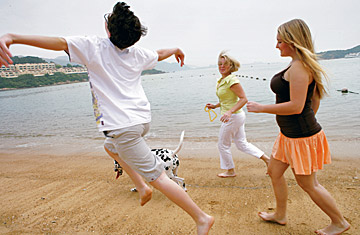
Dagmar Hartley (center, cavorting with her kids in Discovery Bay) moved to Hong Kong to participate in China's economic boom. "There's no smarter place to be right now," she says
A sociologist wanting to observe the Hong Kong expatriate in his native environment could do worse than to ride the Discovery Bay ferry at rush hour. The boat connects the office towers of Hong Kong's main island with Discovery Bay, a bedroom community (population 15,000) on the bucolic island of Lantau that has long been a nesting area for foreigners who prefer to maintain some distance between their families and the tumult and congestion of the city's core. Ten years ago, a trip on the ferry would have placed you in the company of three principal foreign species: Brits, Americans and Canadians. These days, the ferry crowd is a very different mix. At 7 a.m. on a recent spring day, many passengers are pecking at BlackBerries and talking on mobile phones, but eavesdropping is practically impossible because too many languages are in play. Cantonese and English may be Hong Kong's primary tongues, but on this 30-minute trip to Central, you'd be just as well off knowing Hindi, Mandarin, Malay or Spanish.
Or, if you happen to sit behind Dagmar Hartley, best to try Czech. Hartley, 45, escaped Czechoslovakia in the 1980s and fled to Canada, where she met and married a shoe distributor whose business shuttled the couple between Canada and Europe for most of the 1990s. Three years ago, Hartley accepted a position managing a supply-chain operation in Hong Kong, and with two kids in tow, the family moved to the SAR. "I've always followed opportunity," Hartley says, "and there's no smarter place to be than Hong Kong right now. It's the gateway to China."
In a way, Hartley and the ferry's rainbow coalition of arrivistes are not supposed to be here. In 1997, the conventional wisdom was that post-handover Hong Kong was destined to become "just another Chinese city," a phrase that was repeated so often some joked it should be made the SAR's official motto. With Beijing in control, the thinking went, Hong Kong's international and cosmopolitan charms (English spoken nearly everywhere, trains running on time, good Italian restaurants, etc.) would quickly fade. Foreigners would depart by the planeload, especially the Anglo-American crowd that dominated politics and business during British rule.
That assumption has turned out to be partially correct: Westerners have indeed fled in droves. Over the past decade, economic setbacks like the Asian financial crisis and the SARS scare caused companies to cut back and sullied Hong Kong's reputation as a land of opportunity in the eyes of many gweilos ("ghostly men," as Caucasians are called locally). Between 1996 and 2006, according to census data, the number of British citizens living in Hong Kong plunged 85%, from 175,000 to 25,000. Once Hong Kong's largest foreign contingent by far, Britons are now vastly outnumbered by the Filipino domestic helpers who once watched their kids and did their laundry. American and Canadian populations have also declined. Last year there were 15,000 fewer Americans (down 53%) and 20,000 fewer Canadians (down 63%) calling the SAR home than there were in 1996. Overall, there has been a 23% drop in the number of Caucasians, from 47,000 to 36,000, in the past five years alone.
But predictions that "Asia's World City"—the government slogan for Hong Kong—would as a result of this exodus become more provincial and more like mainland China have not come to pass. The faces may change, but the size of the international community has remained fairly constant. In 1996, there were 594,000 foreigners in Hong Kong, or 9.6% of the total population. The proportion dropped to 6.7% in 2001, but the ranks have been rising since then, to 7.1% in 2006. As the old guard left, they have been replaced by others from developing nations who are attracted to Hong Kong's booming economy. For example, between 1996 and 2006 there was an influx of 9,000 South Asians (Indians, Pakistanis, Bangladeshis and Sri Lankans), a 43% increase. During the same period, the number of Indonesians leaped fivefold to 110,000, making them the third-largest group behind mainland Chinese and Filipinos. Overseas ethnic Chinese are also migrating to Hong Kong. From 1996 to 2006, their numbers increased 33% to 86,000, making them the fourth largest group.
Today, foreigners from other Asian countries account for nearly 80% of the city's international contingent—and many say Hong Kong is a more open and equitable place as a result. "Expatriates have changed from being part of a dominant and privileged clique to a diffuse presence in a cosmopolitan city," local author May Holdsworth wrote in her 2002 book Foreign Devils: Expatriates in Hong Kong. Says Margaret Shaffer, an American academic formerly with Hong Kong Baptist University who studies the city's international community: "You notice more non-Chinese Asians, more Indians, more non-Western Europeans in the workforce than ever before. Simply put, Hong Kong has become a more diverse place to live."